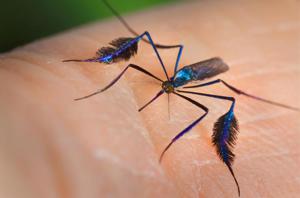Kat KelleyGHTC
Kat Kelly is a senior program assistant at GHTC who supports GHTC's communications and member engagement activities.
To bypass unreliable roads, a project funded by the Bill & Melinda Gates Foundation and the United Nations Population Fund is using drones to deliver contraceptives, condoms, and other health supplies to remote villages in sub-Saharan Africa. A drone operator, located in an urban area, loads the supplies into the machine and guides it to its destination, such as a rural health facility. After a successful pilot in Ghana, the project is expanding into six additional African nations, with several governments themselves offering to foot the bill, at just US$15 per flight.
Researchers at Brigham Young University in Utah are developing a mobile vaccine kit, with the hope of making vaccine manufacturing as easy as making a Cup of Noodles. The kit is comprised of a one to three liter package and produces antigens—molecules that elicit an immune response, and can result in immunity against a certain pathogen. A health worker merely adds water and the kit generates a vaccine that can be used that same day. The kit is reusable and can be freeze-dried, and thus can be stored at temperatures up to 77 degrees Fahrenheit, which requires much less energy than storing traditional vaccines. The team has successfully used the kit to produce a cancer-fighting protein, and is currently testing its vaccine production capabilities.
GHTC member IVCC is leading a $65 million initiative to expand access to new insecticides in 16 malaria-endemic African countries over four years, with the hope of protecting 50 million people from malaria. The project will focus on spraying indoor walls with insecticides, a practice that despite its efficacy against malaria, has decreased by 40 percent over the past few years as mosquitos have become resistant to older, affordable insecticides and as new insecticides remain expensive. IVCC will be partnering with UNITAID, who will help fund the cost of insecticides, as well as GHTC member PATH and the US President’s Malaria Initiative, among others. Insecticides are a critical tool in malaria control, and up to 80 percent of malaria cases prevented since 2000 are attributable to insecticides. However, if new insecticides are not developed and adopted, malaria deaths could increase by 120,000 annually.

Last week, the World Health Organization declared the Zika virus outbreak in Latin America a Public Health Emergency of International Concern, calling for expedited research and development for Zika vaccines and diagnostics. Currently, the most promising Zika virus vaccine candidates come from small biotech companies, including the Indian firm Bharat Biotech and Pennsylvania-based Inovio Pharmaceuticals. Bharat Biotech has two vaccine candidates against Zika, one that uses Zika and another comprised of a weakened version of the virus. The company launched its Zika program in November 2014, due to its similarity to dengue and chikungunya, which are endemic in India. The company is on the verge of animal studies, which will take approximately five months. Inovio is developing a DNA vaccine as well, an approach that is much faster but often less effective than using an inactivated version of the virus itself. Inovio is currently testing the vaccine in mice and plans to initiate testing in primates within “the next few weeks.” Meanwhile, Sanofi has initiated a Zika vaccine program, building on its experience developing a vaccine for the related dengue virus. Sanofi, the fourth largest pharmaceutical company worldwide, is joined by five more of the top ten—Pfizer, Merck & Co., Johnson & Johnson, GlaxoSmithKline, and Takeda—who are all currently evaluating their existing vaccine technologies and platforms.